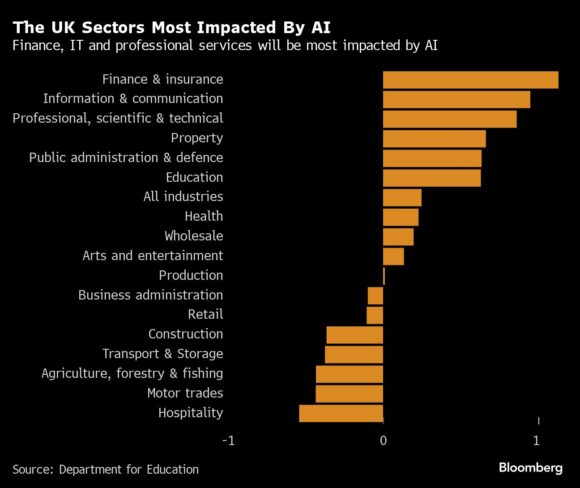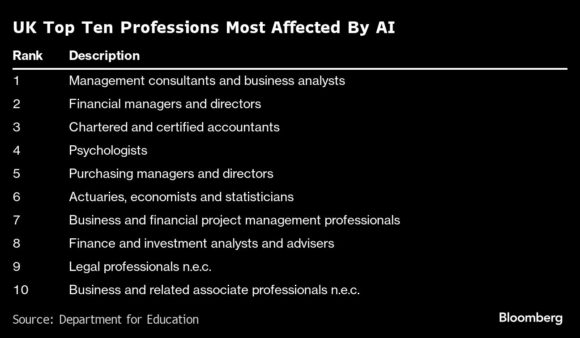Management consultants and City of London finance workers are among those most exposed to workplace changes ushered in by artificial intelligence, a new UK government report found, urging changes in schools and training programs to ease the impact.
Jobs in the finance and insurance sector are the most affected by the adoption of AI, the analysis by the UK Department for Education’s Unit for Future Skills determined. London was the region most likely to see labor market disruptions from the technology due to its high concentration of professional roles.
Related articles: Meet Your New Employee: Advanced AI; Artificial Intelligence Not Main Cause of Recent Insurance Layoffs: AM Best
“Advances in artificial intelligence are widely expected to have a profound and widespread effect on the UK economy and society, though the precise nature and speed of this effect is uncertain” the report said. “The UK education system and employers will need to adapt to ensure that individuals in the workforce have the skills they need to make the most of the potential benefits.”

The study, which applied methods developed by US researchers, is one of the first efforts to assess the impact of AI and large-language models on the UK jobs market. The analysis measured the impact of a range of AI applications on the skills required for different jobs, without distinguishing between the technology’s potential negative or positive effects.
Management consultants were singled out as the occupation most exposed to any of the 10 AI applications included in the study, from image recognition to language modeling or translation. The technology is most likely to transform professional roles such as lawyers, accountants and financial managers. Teachers are also among the roles diagnosed with high AI exposure.
The Big Four audit firms have been ramping up investment on AI as they look to boost productivity, while banks are warming up to the idea of using the technology to get more out of their workers. Some also say those productivity gains may translate into a hiring slowdown for roles like software engineering.

The UK government report also found that workers with degree-level qualifications were more exposed to see their jobs changed by AI, while staff in industries like construction or manufacturing were more likely to remain relatively unscathed.
Photograph: A trader is reflected in a market screen on the floor of the New York Stock Exchange (NYSE) on August 25, 2015 in New York City. Photo credit: Spencer Platt/Getty Images.





















 Experts Say It’s Difficult to Tie AI to Layoffs
Experts Say It’s Difficult to Tie AI to Layoffs  What Analysts Are Saying About the 2026 P/C Insurance Market
What Analysts Are Saying About the 2026 P/C Insurance Market  Preparing for an AI Native Future
Preparing for an AI Native Future  Nearly 26.2M Workers Are Expected to Miss Work on Super Bowl Monday
Nearly 26.2M Workers Are Expected to Miss Work on Super Bowl Monday 


